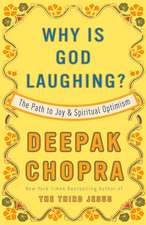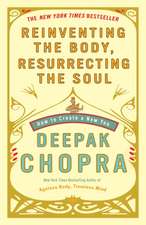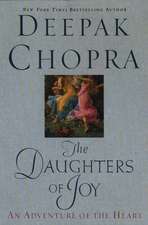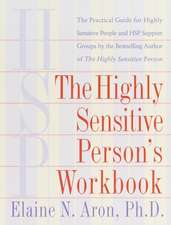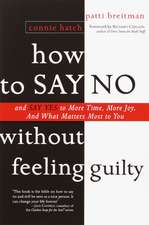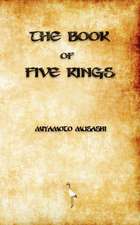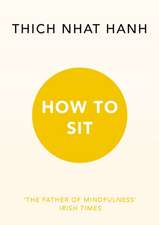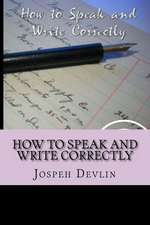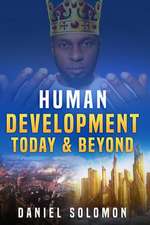The Spontaneous Fulfillment of Desire: Harnessing the Infinite Power of Coincidence
Autor Dr. Deepak Chopraen Limba Engleză Paperback – 31 iul 2004
From this realm of pure potential we are connected to everything that exists and everything that is yet to come. “Coincidences” can then be recognized as containing precious clues about particular facets of our lives that require our attention. As you become more aware of coincidences and their meanings, you begin to connect more and more with the underlying field of infinite possibilities. This is when the magic begins. This is when you achieve the spontaneous fulfillment of desire.
At a time when world events may leave us feeling especially insignificant and vulnerable, Deepak Chopra restores our awareness of the awesome powers within us. And through specific principles and exercises he provides the tools with which to create the magnificent, miraculous life that is our birthright.
From the Hardcover edition.
Preț: 96.93 lei
Nou
Puncte Express: 145
Preț estimativ în valută:
18.55€ • 19.37$ • 15.32£
18.55€ • 19.37$ • 15.32£
Carte disponibilă
Livrare economică 25 martie-08 aprilie
Preluare comenzi: 021 569.72.76
Specificații
ISBN-13: 9781400054312
ISBN-10: 1400054311
Pagini: 304
Dimensiuni: 143 x 205 x 20 mm
Greutate: 0.25 kg
Ediția:Revised
Editura: HARMONY
ISBN-10: 1400054311
Pagini: 304
Dimensiuni: 143 x 205 x 20 mm
Greutate: 0.25 kg
Ediția:Revised
Editura: HARMONY
Notă biografică
Deepak Chopra’s many books have become international bestsellers and classics of their kind.
Dr. Chopra is founder of the Chopra Center for Well Being in Carlsbad, California.
From the Hardcover edition.
Dr. Chopra is founder of the Chopra Center for Well Being in Carlsbad, California.
From the Hardcover edition.
Extras
Matter, Mind, and Spirit
From the moment we become aware of the world around us, we begin to wonder about our place within it. The questions we ask are timeless: Why am I here? How do I fit into the scheme of things? What is my destiny? As children, we tend to think of the future as a clean sheet of paper upon which we can write our own stories. The possibilities seem endless, and we are energized by the promise of discovery and the sheer pleasure of living immersed in so much potential. But as we grow up, become adults, and are "educated" about our limitations, our view of the future becomes constricted. What once lifted our imaginations now weighs us down with dread and anxiety. What once felt boundless becomes narrow and dark.
There is a way to regain the soaring joy of unlimited potential. All that is required is an understanding of the true nature of reality, a willingness to recognize the interrelatedness and inseparability of all things. Then, aided by specific techniques, you will find the world opening up to you, and the good luck and opportunities that popped up every once in a while will occur more and more frequently. How powerful is synchrodestiny? Imagine for a moment that you find yourself with a flashlight in your hand in a room that is totally dark. You turn on the flashlight and see a beautiful painting hanging on the wall. You might think, "Sure, this is a wonderful work of art, but is this all there is?" Then, all at once, the room becomes illuminated from above. You look around and see that you are in an art museum, with hundreds of paintings on the walls around you, each more beautiful than the last. As these possibilities stand revealed to you, you realize you have a lifetime of art to study and love. You are no longer constrained to view just one painting lit by the weak glow of your flashlight.
This is the promise of synchrodestiny. It turns on the lights. It gives us the ability to make real decisions instead of blind guesses as we move forward in our lives. It allows us to see meaning in the world, to understand the connectedness or synchronicity of all things, to choose the kind of life we want to live, and to fulfill our spiritual journey. With synchrodestiny, we gain the ability to transform our lives according to our intentions.
The first step to living this way is to understand the nature of the three levels of existence.
Level 1:
THE PHYSICAL DOMAIN
The first level of existence is physical or material, the visible universe. This is the world we know best, what we call the real world. It contains matter and objects with firm boundaries, everything that is three-dimensional, and it includes everything we experience with our five senses--all that we can see, hear, feel, taste, or smell. It includes our bodies, the wind, the earth, water, gases, animals, microbes, molecules, and the pages of this book. In the physical domain time seems to flow in a line so straight that we call it the arrow of time, from the past to the present to the future. This means that everything in the physical domain has a beginning, a middle, and an end, and is therefore impermanent. Sentient beings are born and die. Mountains soar from the molten core of the earth and are brought low again by the relentless scouring of rain and wind.
The physical world as we experience it is governed by immutable laws of cause and effect, so that everything is predictable. Newtonian physics allows us to predict action and reaction, so that when billiard balls hit each other with a particular speed and at a particular angle, we can anticipate exactly what route each will travel across the billiards table. Scientists can calculate precisely when a solar eclipse will occur and how long it will last. All of our "commonsense" understanding of the world comes from what we know of this physical domain.
Level 2:
THE QUANTUM DOMAIN
At the second level of existence everything consists of information and energy. This is called the quantum domain. Everything at this level is insubstantial, meaning that it cannot be touched or perceived by any of the five senses. Your mind, your thoughts, your ego, the part of you that you typically think of as your "self" are all part of the quantum domain. These things have no solidity, and yet you know your self and your thoughts to be real. Although it is easiest to think of the quantum domain in terms of mind, it encompasses much more. In fact, everything in the visible universe is a manifestation of the energy and information of the quantum domain. The material world is a subset of the quantum world.
Another way of stating this is that everything in the physical domain is made up of information and energy. In Einstein's famous equation, E = MC2, we learn that energy (E) equals mass (M) times the speed of light (C) squared. This tells us that matter (mass) and energy are the same thing only in different forms--energy equals mass.
One of the first science lessons taught in school is that every solid object is made up of molecules, and molecules are made up of even smaller units called atoms. We come to understand that this seemingly solid chair we are sitting on is made up of atoms so small that they cannot be seen without the aid of a powerful microscope. Later in the lesson we learn that tiny atoms are made up of subatomic particles, which have no solidity at all. They are, quite literally, packets or waves of information and energy. This means that, at this second level of existence, the chair you are sitting in is nothing but energy and information.
This concept can be difficult to grasp at first. How can invisible waves of energy and information be experienced as a solid object? The answer is that events in the quantum domain occur at the speed of light, and at that speed our senses simply cannot process everything that contributes to our perceptual experience. We perceive objects as being different from one to the next because energy waves contain different kinds of information, which are determined by the frequency or vibration of those energy waves. It's like listening to the radio. A radio tuned to one station, say 101.5 FM, might play only classical music. Change to a slightly different frequency of radio waves by tuning in to, say, 101.9 FM, and you might hear only rock and roll. Energy is coded for different information depending on how it vibrates.
So the physical world, the world of objects and matter, is made up of nothing but information contained in energy vibrating at different frequencies. The reason we don't see the world as a huge web of energy is that it is vibrating far too fast. Our senses, because they function so slowly, are able to register only chunks of this energy and activity, and these clusters of information become "the chair," "my body," "water," and every other physical object in the visible universe.
This is similar to what happens when we watch a movie. As you know, a motion picture is made up of individual photographic frames with gaps in between frames. If you looked at a movie film on the reel in a projection room, you would see the individual frames and gaps. But when we watch the movie itself, the frames are strung together and played back so fast that our senses no longer observe the frames as discontinuous. Instead, we perceive a steady stream of information.
At the quantum level, the various chunks of energy fields vibrating at different frequencies that we perceive as solid objects are all part of a collective energy field. If we were capable of perceiving everything that was happening at the quantum level, we would see that we are all part of a great "energy soup," and everything--each one of us and all the objects in the physical domain--is just a cluster of energy floating in this energy soup. At any given moment your energy field will come into contact with and affect everyone else's energy field, and each of us responds in some way to that experience. We are all expressions of this communal energy and information. Sometimes we can actually feel this connectedness. This sensation is usually very subtle, but on occasion it becomes more tangible. Most of us have had the experience of walking into a room and sensing "tension so thick you could cut it with a knife," or of being in a church or holy shrine and being engulfed by a sense of peace. That is the collective energy of the environment mingling with your own energy, which you register on some level.
In the physical domain we are also constantly exchanging energy and information. Imagine that you are standing on the street and you smell cigarette smoke from someone walking a block away. This means you are inhaling the breath of that person about one hundred yards away. The smell is just a tracer notifying you that you are inhaling someone else's breath. If the tracer wasn't there, if the person walking by wasn't smoking, you would still be inhaling that person's breath; you just wouldn't know it without cigarette smoke to alert you. And what is breath? It is the carbon dioxide and oxygen that come from the metabolism of every cell in that stranger's body. That is what you are inhaling, just as other people are inhaling your breath. So we are all constantly exchanging bits of ourselves--physical, measurable molecules from our bodies.
At a deeper level, there is really no boundary between our selves and everything else in the world. When you touch an object, it feels solid, as though there was a distinct boundary between it and you. Physicists would say that we experience that boundary as solid because everything is made up of atoms, and the solidity is the sense of atoms bumping against atoms. But consider what an atom is. An atom has a little nucleus with a large cloud of electrons around it. There is no rigid outer shell, just an electron cloud. To visualize this, imagine a peanut in the middle of a football stadium. The peanut represents the nucleus, and the stadium represents the size of the electron cloud around the nucleus. When we touch an object, we perceive solidity when the clouds of electrons meet. That is our interpretation of solidity, given the sensitivity (or relative insensitivity) of our senses. Our eyes are programmed to see objects as three-dimensional and solid. Our nerve endings are programmed to feel objects as three-dimensional and solid. In the reality of the quantum domain, however, there is no solidity. Is there solidity when two clouds meet? No. They meld and separate. Something similar happens whenever you touch another object. Your energy fields (and electron clouds) meet, small portions meld, and then you separate. Although you perceive yourself to be whole, you have lost a bit of your energy field to the object, and have gained a bit of its energy field in return. With every encounter, we exchange information and energy, and we come away changed just a little bit. In this way, too, we can see how connected we are to everything else in the physical world. We are all constantly sharing portions of our energy fields, so all of us, at this quantum level, at the level of our minds and our "selves," are all connected. We are all correlated with one another.
So it is only in our consciousness that our limited senses create a solid world out of pure energy and information. But what if we could see into the quantum domain--if we had "quantum eyes"? In the quantum domain, we would see that everything we think of as solid in the physical world is actually flickering in and out of an infinite void at the speed of light. Just like the frame-and-gap sequence of a motion picture, the universe is an on-off phenomenon. The continuity and solidity of the world exists only in the imagination, fed by senses that cannot discern the waves of energy and information that make up the quantum level of existence. In reality, we are all flickering in and out of existence all the time. If we could fine-tune our senses, we could actually see the gaps in our existence. We are here, and then not here, and then here again. The sense of continuity is held only by our memories.
There is an analogy that illustrates this point. Scientists know that it takes a snail about three seconds to register light. So imagine that a snail was watching me, and that I left the room, robbed a bank, and came back in three seconds. As far as the snail was concerned, I never left the room. I could take her to court and she would provide a perfect alibi. For the snail, the time that I was gone from the room would fall into one of those gaps between the frames of flickering existence. Her sense of continuity, assuming snails have one, would simply not register the gap.
So the sensory experience of all living beings is a purely artificial perceptual construct created in the imagination. There is a Zen story in which two monks are looking at a flag that is waving in the wind. The first one says, "The flag is waving." The second one says, "No, the wind is moving." Their teacher comes over and they pose him the question. "Who's right? I say the flag is moving. He says the wind is moving." The teacher says, "You are both wrong. Only consciousness is moving." As consciousness moves, it imagines the world into existence.
So the mind is a field of energy and information. Every idea is also energy and information. You have imagined your physical body and the whole physical world into existence by perceiving energy soup as distinct physical entities. But where does the mind responsible for this imagination come from?
Level 3:
THE NONLOCAL DOMAIN
The third level of existence consists of intelligence, or consciousness. This can be called the virtual domain, the spiritual domain, the field of potential, the universal being, or nonlocal intelligence. This is where information and energy emerge from a sea of possibilities. The most fundamental, basic level of nature is not material; it is not even energy and information soup; it is pure potential. This level of nonlocal reality operates beyond the reach of space and time, which simply do not exist at this level. We call it nonlocal because it cannot be confined by a location--it is not "in" you or "out there." It simply is.
From the Hardcover edition.
From the moment we become aware of the world around us, we begin to wonder about our place within it. The questions we ask are timeless: Why am I here? How do I fit into the scheme of things? What is my destiny? As children, we tend to think of the future as a clean sheet of paper upon which we can write our own stories. The possibilities seem endless, and we are energized by the promise of discovery and the sheer pleasure of living immersed in so much potential. But as we grow up, become adults, and are "educated" about our limitations, our view of the future becomes constricted. What once lifted our imaginations now weighs us down with dread and anxiety. What once felt boundless becomes narrow and dark.
There is a way to regain the soaring joy of unlimited potential. All that is required is an understanding of the true nature of reality, a willingness to recognize the interrelatedness and inseparability of all things. Then, aided by specific techniques, you will find the world opening up to you, and the good luck and opportunities that popped up every once in a while will occur more and more frequently. How powerful is synchrodestiny? Imagine for a moment that you find yourself with a flashlight in your hand in a room that is totally dark. You turn on the flashlight and see a beautiful painting hanging on the wall. You might think, "Sure, this is a wonderful work of art, but is this all there is?" Then, all at once, the room becomes illuminated from above. You look around and see that you are in an art museum, with hundreds of paintings on the walls around you, each more beautiful than the last. As these possibilities stand revealed to you, you realize you have a lifetime of art to study and love. You are no longer constrained to view just one painting lit by the weak glow of your flashlight.
This is the promise of synchrodestiny. It turns on the lights. It gives us the ability to make real decisions instead of blind guesses as we move forward in our lives. It allows us to see meaning in the world, to understand the connectedness or synchronicity of all things, to choose the kind of life we want to live, and to fulfill our spiritual journey. With synchrodestiny, we gain the ability to transform our lives according to our intentions.
The first step to living this way is to understand the nature of the three levels of existence.
Level 1:
THE PHYSICAL DOMAIN
The first level of existence is physical or material, the visible universe. This is the world we know best, what we call the real world. It contains matter and objects with firm boundaries, everything that is three-dimensional, and it includes everything we experience with our five senses--all that we can see, hear, feel, taste, or smell. It includes our bodies, the wind, the earth, water, gases, animals, microbes, molecules, and the pages of this book. In the physical domain time seems to flow in a line so straight that we call it the arrow of time, from the past to the present to the future. This means that everything in the physical domain has a beginning, a middle, and an end, and is therefore impermanent. Sentient beings are born and die. Mountains soar from the molten core of the earth and are brought low again by the relentless scouring of rain and wind.
The physical world as we experience it is governed by immutable laws of cause and effect, so that everything is predictable. Newtonian physics allows us to predict action and reaction, so that when billiard balls hit each other with a particular speed and at a particular angle, we can anticipate exactly what route each will travel across the billiards table. Scientists can calculate precisely when a solar eclipse will occur and how long it will last. All of our "commonsense" understanding of the world comes from what we know of this physical domain.
Level 2:
THE QUANTUM DOMAIN
At the second level of existence everything consists of information and energy. This is called the quantum domain. Everything at this level is insubstantial, meaning that it cannot be touched or perceived by any of the five senses. Your mind, your thoughts, your ego, the part of you that you typically think of as your "self" are all part of the quantum domain. These things have no solidity, and yet you know your self and your thoughts to be real. Although it is easiest to think of the quantum domain in terms of mind, it encompasses much more. In fact, everything in the visible universe is a manifestation of the energy and information of the quantum domain. The material world is a subset of the quantum world.
Another way of stating this is that everything in the physical domain is made up of information and energy. In Einstein's famous equation, E = MC2, we learn that energy (E) equals mass (M) times the speed of light (C) squared. This tells us that matter (mass) and energy are the same thing only in different forms--energy equals mass.
One of the first science lessons taught in school is that every solid object is made up of molecules, and molecules are made up of even smaller units called atoms. We come to understand that this seemingly solid chair we are sitting on is made up of atoms so small that they cannot be seen without the aid of a powerful microscope. Later in the lesson we learn that tiny atoms are made up of subatomic particles, which have no solidity at all. They are, quite literally, packets or waves of information and energy. This means that, at this second level of existence, the chair you are sitting in is nothing but energy and information.
This concept can be difficult to grasp at first. How can invisible waves of energy and information be experienced as a solid object? The answer is that events in the quantum domain occur at the speed of light, and at that speed our senses simply cannot process everything that contributes to our perceptual experience. We perceive objects as being different from one to the next because energy waves contain different kinds of information, which are determined by the frequency or vibration of those energy waves. It's like listening to the radio. A radio tuned to one station, say 101.5 FM, might play only classical music. Change to a slightly different frequency of radio waves by tuning in to, say, 101.9 FM, and you might hear only rock and roll. Energy is coded for different information depending on how it vibrates.
So the physical world, the world of objects and matter, is made up of nothing but information contained in energy vibrating at different frequencies. The reason we don't see the world as a huge web of energy is that it is vibrating far too fast. Our senses, because they function so slowly, are able to register only chunks of this energy and activity, and these clusters of information become "the chair," "my body," "water," and every other physical object in the visible universe.
This is similar to what happens when we watch a movie. As you know, a motion picture is made up of individual photographic frames with gaps in between frames. If you looked at a movie film on the reel in a projection room, you would see the individual frames and gaps. But when we watch the movie itself, the frames are strung together and played back so fast that our senses no longer observe the frames as discontinuous. Instead, we perceive a steady stream of information.
At the quantum level, the various chunks of energy fields vibrating at different frequencies that we perceive as solid objects are all part of a collective energy field. If we were capable of perceiving everything that was happening at the quantum level, we would see that we are all part of a great "energy soup," and everything--each one of us and all the objects in the physical domain--is just a cluster of energy floating in this energy soup. At any given moment your energy field will come into contact with and affect everyone else's energy field, and each of us responds in some way to that experience. We are all expressions of this communal energy and information. Sometimes we can actually feel this connectedness. This sensation is usually very subtle, but on occasion it becomes more tangible. Most of us have had the experience of walking into a room and sensing "tension so thick you could cut it with a knife," or of being in a church or holy shrine and being engulfed by a sense of peace. That is the collective energy of the environment mingling with your own energy, which you register on some level.
In the physical domain we are also constantly exchanging energy and information. Imagine that you are standing on the street and you smell cigarette smoke from someone walking a block away. This means you are inhaling the breath of that person about one hundred yards away. The smell is just a tracer notifying you that you are inhaling someone else's breath. If the tracer wasn't there, if the person walking by wasn't smoking, you would still be inhaling that person's breath; you just wouldn't know it without cigarette smoke to alert you. And what is breath? It is the carbon dioxide and oxygen that come from the metabolism of every cell in that stranger's body. That is what you are inhaling, just as other people are inhaling your breath. So we are all constantly exchanging bits of ourselves--physical, measurable molecules from our bodies.
At a deeper level, there is really no boundary between our selves and everything else in the world. When you touch an object, it feels solid, as though there was a distinct boundary between it and you. Physicists would say that we experience that boundary as solid because everything is made up of atoms, and the solidity is the sense of atoms bumping against atoms. But consider what an atom is. An atom has a little nucleus with a large cloud of electrons around it. There is no rigid outer shell, just an electron cloud. To visualize this, imagine a peanut in the middle of a football stadium. The peanut represents the nucleus, and the stadium represents the size of the electron cloud around the nucleus. When we touch an object, we perceive solidity when the clouds of electrons meet. That is our interpretation of solidity, given the sensitivity (or relative insensitivity) of our senses. Our eyes are programmed to see objects as three-dimensional and solid. Our nerve endings are programmed to feel objects as three-dimensional and solid. In the reality of the quantum domain, however, there is no solidity. Is there solidity when two clouds meet? No. They meld and separate. Something similar happens whenever you touch another object. Your energy fields (and electron clouds) meet, small portions meld, and then you separate. Although you perceive yourself to be whole, you have lost a bit of your energy field to the object, and have gained a bit of its energy field in return. With every encounter, we exchange information and energy, and we come away changed just a little bit. In this way, too, we can see how connected we are to everything else in the physical world. We are all constantly sharing portions of our energy fields, so all of us, at this quantum level, at the level of our minds and our "selves," are all connected. We are all correlated with one another.
So it is only in our consciousness that our limited senses create a solid world out of pure energy and information. But what if we could see into the quantum domain--if we had "quantum eyes"? In the quantum domain, we would see that everything we think of as solid in the physical world is actually flickering in and out of an infinite void at the speed of light. Just like the frame-and-gap sequence of a motion picture, the universe is an on-off phenomenon. The continuity and solidity of the world exists only in the imagination, fed by senses that cannot discern the waves of energy and information that make up the quantum level of existence. In reality, we are all flickering in and out of existence all the time. If we could fine-tune our senses, we could actually see the gaps in our existence. We are here, and then not here, and then here again. The sense of continuity is held only by our memories.
There is an analogy that illustrates this point. Scientists know that it takes a snail about three seconds to register light. So imagine that a snail was watching me, and that I left the room, robbed a bank, and came back in three seconds. As far as the snail was concerned, I never left the room. I could take her to court and she would provide a perfect alibi. For the snail, the time that I was gone from the room would fall into one of those gaps between the frames of flickering existence. Her sense of continuity, assuming snails have one, would simply not register the gap.
So the sensory experience of all living beings is a purely artificial perceptual construct created in the imagination. There is a Zen story in which two monks are looking at a flag that is waving in the wind. The first one says, "The flag is waving." The second one says, "No, the wind is moving." Their teacher comes over and they pose him the question. "Who's right? I say the flag is moving. He says the wind is moving." The teacher says, "You are both wrong. Only consciousness is moving." As consciousness moves, it imagines the world into existence.
So the mind is a field of energy and information. Every idea is also energy and information. You have imagined your physical body and the whole physical world into existence by perceiving energy soup as distinct physical entities. But where does the mind responsible for this imagination come from?
Level 3:
THE NONLOCAL DOMAIN
The third level of existence consists of intelligence, or consciousness. This can be called the virtual domain, the spiritual domain, the field of potential, the universal being, or nonlocal intelligence. This is where information and energy emerge from a sea of possibilities. The most fundamental, basic level of nature is not material; it is not even energy and information soup; it is pure potential. This level of nonlocal reality operates beyond the reach of space and time, which simply do not exist at this level. We call it nonlocal because it cannot be confined by a location--it is not "in" you or "out there." It simply is.
From the Hardcover edition.
Descriere
This groundbreaking new book from Chopra contains a dramatic premise: not only are everyday coincidences meaningful, they actually provide glimpses of the field of infinite possibilities that lies at the heart of all things.



